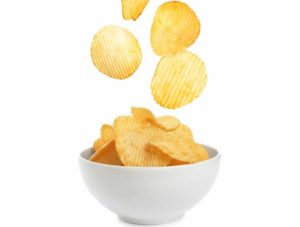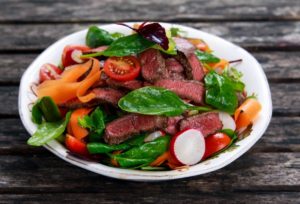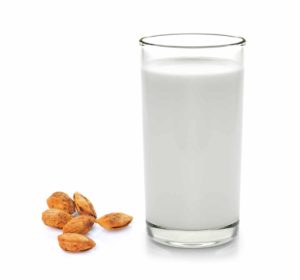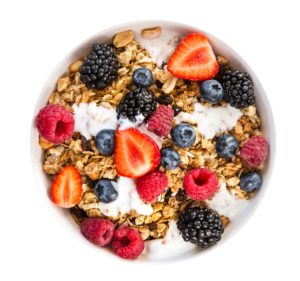Weight Management/Weight Loss
Ditching the Diet Mentality
Did you know that dieting is ineffective at best and counterproductive at worse, with up to two-thirds of dieters regaining more weight than they lose (Mann et al. 2007)? Isn’t there a better way to eat healthfully?
One option is intuitive eating, which forgoes dieting and focuses on driving long-term improvements in your relationship with food. “Intuitive eating is the ability to read, interpret and follow your internal cues regarding the right amount of food for your body,” says Krista Scott-Dixon, PhD, curriculum director at Precision Nutrition.
Down the Middle for Carb Intake
Perhaps the next big eating trend is the not-too-sexy-sounding medium-carb diet.
To Eat Better, Don’t Pump Up the Jams
No wonder people tend to order fried wings and other nutritional duds at rowdy sports bars. A recent study from the University of South Florida’s Muma College of Business discovered that people tend to make healthier food choices in the presence of low-volume, softer music or background noise than they do in loud environments.
Nutrition Hacks Based on Hard Science
“Diets” don’t work. By now, most health and fitness professionals know that restrictive meal plans usually fail. We also see how diets deprive people of foods they enjoy, fueling a constant cycle of weight loss and gain.
But what do we tell fitness clients who want to lose weight? The key is helping them reframe their diet mentality toward healthful living and better nutrition—without sacrificing their favorite foods or compromising taste. These tips will help you provide that guidance.
Nutrition Adherence: Making Lifestyle Changes That Stick
Research has shown that the best weight loss plan is the one people can stick with for the long term (Johnston et al. 2014). For some, that may be a low-carbohydrate, high-protein diet. For others, it may be a high-carbohydrate plan that’s low in saturated fat. Yet another group may need a complete macronutrient balance.
The Confidence-First Approach to Weight Loss
Benefiting from family ties. When 20-year-old Erick first met Ethan Kopsch, NASM-certified personal trainer and owner of Bird Rock Fit in La Jolla, California, Erick was less than eager to start a training program. Kopsch had been training Erick’s mom for some time, and she was so pleased with her progress that she encouraged Erick and her daughter, Michelle, to work with the trainer.
More Exercise Is Key to Weight Loss Success
New research may help solve the problem of why many people who increase their activity fail to lose weight. Although exercise burns calories, previous studies have shown that many people compensate for the increased activity by eating and resting more, thus negating some potential weight loss benefits.
Fans of NFL Losers Are Fans of Fatty Food
Now that we are in the thick of football season, the jubilation or sadness that comes with rooting for the victors or the vanquished may influence eating behaviors come Monday. A study in the journal Psychological Science found that the outcome of an NFL game can alter fans’ eating habits a day later, for better or worse.
Weight Gain Is Bad News for Our Gustatory Mojo
Studies have shown that people with obesity have a blunted sense of taste, so they have to eat more richly flavored foods (more sugary and higher in fat) to glean as much sensory satisfaction from a meal as their leaner peers. This could help in understanding why heavier people have a hard time losing weight.
Full-Fat Dairy Makes a Comeback?
An ever-expanding pile of research papers is challenging the idea that we need to avoid full-fat varieties of dairy products like yogurt and milk. There may be no need to settle for fat-free versions that could be less satisfying: For instance, a new study published in The American Journal of Clinical Nutrition involving more than 2,900 U.S. seniors aged 65 and above found that whole-fat dairy consumption appears to do little harm when it comes to cardiovascular disease.
A Mindful Trick Could Trim Calories
With its deluge of pies and creamy dips, the holiday season can be a dangerous time for diets, leaving people with extra New Year poundage to work off
in the gym. It doesn’t have to be: A simple switch in meal-planning mindset can help people keep their portions in check, according to a study presented in
July 2018 at the annual meeting of the Society for the Study of Ingestive Behavior, a global conference for eating research experts.
An Action Plan to Combat Adolescent Obesity
Health and fitness professionals can drive positive outcomes and minimize the risk adolescent obesity with these five “rules” for coaching.
Obesity Boosts Melanoma Risk
Add this to the list of dangers associated with obesity: New research from Sweden suggests obesity is a risk factor for developing skin cancer, and weight loss—in this case via bariatric surgery—could reduce the risk of malignant melanoma skin cancer, in particular, by 61%.
The study included 2,007 bariatric surgery patients and 2,040 nonsurgery controls whose skin cancer incidence was monitored for 18 years. Aside from the significantly lower risk of developing malignant melanoma, the surgery group saw a 42% reduction in skin cancer risk in general.
Question of the Month
It will soon be easier for consumers to make better food and beverage decisions when eating out or on the go. The U.S. Food and Drug Administration (FDA) has moved forward with a food labeling law that requires restaurants, grocery stores and convenience stores with 20 or more locations to post calorie counts for standard menu items. Proponents say calorie disclosures on everything from muffins to lattes to Happy Meals will offer more transparency and will likely encourage diners to downsize their consumption.
Keto—Fat Chance of Performing Better
The ketogenic diet, a fat-forward meal plan that limits followers to about 20 grams of daily carbs, may help some people shed a little weight (in the short term), but it might not be good news for their athletic pursuits.
Plant Foods Are Good for Our Gut Bugs
Our bodies host a huge population of microorganisms, dubbed the human microbiome. In recent years, the makeup of critters in our guts has been linked to a plethora of conditions, including depression, heart disease and obesity. And now bug-friendly scientists at the University of California, San Diego School of Medicine have presented initial findings from the American Gut Project, a crowdsourced initiative that analyzes people’s survey responses and fecal samples to better understand how things like diet, lifestyle and disease affect the human microbiome.
The New Dairy Queens
One look at the dairy-free milk aisle and it’s clear that food companies are on a tear. Nondairy milk sales in the U.S. increased by 61% from 2012 to 2017, according to the research firm Mintel. For a variety of reasons, from lactose intolerance to the perceived unhealthfulness of cow’s milk, more consumers are floating their cereal in liquids that no longer seem nontraditional. Here’s how some of the moo-free contenders stack up nutritionally.
Belly Fat vs. Vitamin D
Here’s another good reason for people to reduce their Buddha-bellies: improving their vitamin D status. According to data presented at the 2018 European Society of Endocrinology’s annual meeting in Barcelona, Spain, researchers from the Netherlands found that more body fat around adults’ waistline is associated with lower vitamin D levels. Beyond raising the risk of weak bones, poor vitamin D status could set the stage for other health issues, including heart disease and compromised immunity.
Time to Snub the Clubs?
The prospect of getting extra bang for their food buck has more people perusing
warehouse-style club stores like Costco and Sam’s Club. But the urge to stockpile large amounts of food in the house may lead to calorie overload.
Portion Distortion
No wonder social media feeds are packed with pictures of overflowing smoothie bowls: It appears people feel the types of foods they consume play a bigger role in their health goals than the volume they eat. As a result, a study from Vanderbilt University published in Management Science suggests that those who are trying to maintain a healthy body weight or wishing to shed a few pounds might be prone to overeating “healthy” items like nuts, granola and avocados. The upshot: The public should be educated about practicing portion control—for foods of all kinds.



















